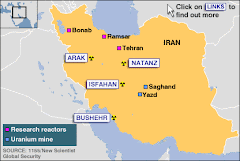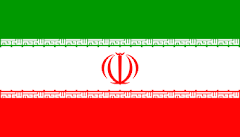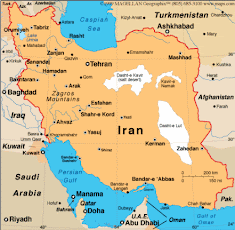
This story is significant because it shows how Iran's nuclear eligilibity is growing daily.




This is important because if Iran and Egypt pull ties together they both can become stronger and help with nuclear rights.
 PAUL JAY, SENIOR EDITOR: The vote over the Kyle-Lieberman amendment, the Senate resolution to declare the Iranian Revolutionary Guard a terrorist
PAUL JAY, SENIOR EDITOR: The vote over the Kyle-Lieberman amendment, the Senate resolution to declare the Iranian Revolutionary Guard a terrorist
CAIRO, Egypt (AP) — Iran's top military commander said Saturday that his forces would retaliate against American military bases in the Persian Gulf if they are involved in any possible future attack on Iran.
General Mohammad Ali Jaafari, commander of the Iran's Revolutionary Guards, told Al-Jazeera television that it is Iran's "natural right to respond" if attacked
by land or air.
But he assured Arab Gulf countries — some of whom are home to U.S. military bases — that only American forces would come under counterattack.
"We realize that there is worry among neighboring countries —
Muslim countries whose lands host U.S. military stations," Jaafari said. He spoke in Farsi, which the network dubbed over in Arabic.
"However, if the U.S. launches a war against us, and if it uses these stations to attack Iran
with missiles, then through the strength and precision of our own missiles, we are capable of targeting only the U.S. military forces who attack us," he told the station.This article is important because Iran has stated that if there is an attack from America they will retaliate. This shows the United States that Iran is becoming more independent.

Iran received the 7th shipment of nuclear fuel from Russia on Saturday for
a power plant being constructed in the southern port of Bushehr,
the official IRNA news agency reported.
The 11-ton consignment of enriched
uranium arrived at the light-water Bushehr nuclear power plant on Saturday
morning, with the final shipment of the fuel expected at a "determined time,"
the agency reported.
"Of 82 tons of initial fuel needed for the Bushehr
nuclear power plant, 77 tons have been shipped to Iran so far," it added.
Click for websiteThis article is important because any time a country buys any time of nuclear equipment it is a big deal for other countries.


Mr Ahmadinejad said Mr Bush had brought a "message of confrontation" during his tour, during which he warned Arab allies that Iran posed a threat.Israel says Tehran could have a nuclear bomb by 2010 and has warned an Iranian nuclear weapon would threaten the Jewish state's existence.Mr Bush told Gulf state leaders during his eight-day tour, which also took in Israel and the West Bank, that Iran was the world's top sponsor of terrorism. But Mr Ahmadinejad hit back on al-Jazeera, saying: "President George Bush sent a message... of rift, a message of sowing the seeds of division. It is a message of confrontation."


U.S. President George W. Bush is finishing his three-day trip to Israel. On
Friday Bush intends to visit Jerusalem’s major places of interest, but the main
goal of Bush’s Mideastern tour is not so peaceful as it may seem at first sight.
The administrations of Mossad and Aman (external
intelligence) prepared a report for Shimon Peres to prove that Iran was going to
build its first A-bomb during the coming several months. The document, of which
the U.S. administration is obviously informed, may counterbalance the recent
report from American special services that said that Teheran suspended its
attempts to make nuclear weapons.
Bush stated after his two-hour meeting
with Israeli Prime Minister Ehud Olmert that Iran
continued to be a “threat to world peace.” The president added that Washington
would continue to show pressure on Teheran.
The president of the Academy of
Geopolitical Sciences of Russia, Leonid Ivashov, said in an interview with
Pravda.ru that Bush’s visit to the Middle East is linked with both the
presidential race and an attempt to retrieve his influence in the troubled
region.
First and foremost, George Bush outlined his
priorities. Israel, its security and support is definitely the first priority
for the States. That may mean that Bush is trying to win the support of the
pro-Israel lobby, especially its financial structures.
The peacemaking
mission of the U.S. president is the second priority. Bush visited Israel to
regulate the conflict with Palestine. To crown it all, Bush is willing to
exercise his readiness to attack Iran. According to his own statements, the U.S.
president views Iran as the country that may start the Third World War.This article is important because it shows how afriad President Bush is about Iran building it's first Nuclear Plant. He accuses Iran of being a "threat to world peace".


By MATTI FRIEDMAN – 21 hours ago
JERUSALEM (AP) — A rocket fired at
Israel by Palestinians earlier this month was made in Iran, an Israeli lawmaker
and security officials said Tuesday.
The origins of the rocket, which hit
the Israeli town of Ashkelon on Jan. 3, offered a further indication of ties
between Gaza's militants and Iran's hard-line Islamic regime.
The military
would not comment on the rocket's provenance at the time, but on Tuesday, Isaac
Ben-Israel, a lawmaker from Prime Minister Ehud Olmert's ruling Kadima party,
said the projectile was manufactured by Iran, Israel's most bitter enemy.
Speaking at a press briefing, Ben-Israel, a retired Israeli air force
general, estimated that Gaza militants had several such weapons in their
arsenal, but "not many." Most of their projectiles are short-range rockets
manufactured in Gaza.
Israeli security officials confirmed Tuesday that the
rocket came from Iran. They could not immediately say if it was the first
Iranian-made rocket to hit Israel.
They spoke on condition of anonymity
because they were not authorized to release an official announcement to the
press.
President Bush, traveling in the Middle East, reiterated U.S. claims
that Iran supports militants "with training and lethal aid."
"Iran's role in
fomenting violence has been exposed," Bush said.
The top U.S. commander in
Iraq, Gen. David Petraeus, has said the overall flow of weaponry from Iran into
Iraq appears to be down. U.S. military officials have been saying for months
that mainly Shiite Iran has been supplying roadside bombs to Shiite militias in
Iraq, despite strong denials by Iran.This is important because Bush is accusing Iran of making violence.

 Israeli Prime Minister
Israeli Prime Minister

